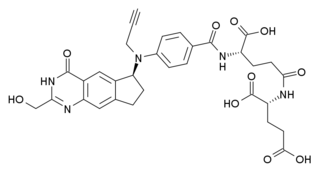
Multiple myeloma (MM), also known as plasma cell myeloma and simply myeloma, is a cancer of plasma cells, a type of white blood cell that normally produces antibodies. Often, no symptoms are noticed initially. As it progresses, bone pain, anemia, renal insuficiency, and infections may occur. Complications may include hypercalcemia and amyloidosis.

The Takeda Pharmaceutical Company Limited is a Japanese multinational pharmaceutical company. It is the third largest pharmaceutical company in Asia, behind Sinopharm and Shanghai Pharmaceuticals, and one of the top 20 largest pharmaceutical companies in the world by revenue. The company has over 49,578 employees worldwide and achieved US$19.299 billion in revenue during the 2018 fiscal year. The company is focused on oncology, rare diseases, neuroscience, gastroenterology, plasma-derived therapies and vaccines. Its headquarters is located in Chuo-ku, Osaka, and it has an office in Nihonbashi, Chuo, Tokyo. In January 2012, Fortune Magazine ranked the Takeda Oncology Company as one of the 100 best companies to work for in the United States. As of 2015, Christophe Weber was appointed as the CEO and president of Takeda.

Amgen Inc. is an American multinational biopharmaceutical company headquartered in Thousand Oaks, California. One of the world's largest independent biotechnology companies, As of 2022, Amgen has approximately 24,000 staff in total.

Bortezomib, sold under the brand name Velcade among others, is an anti-cancer medication used to treat multiple myeloma and mantle cell lymphoma. This includes multiple myeloma in those who have and have not previously received treatment. It is generally used together with other medications. It is given by injection.
Takeda Oncology is a biopharmaceutical company based in Cambridge, Massachusetts. It is a fully owned subsidiary of Takeda Pharmaceutical.

The mission of the Multiple Myeloma Research Consortium (MMRC) is to champion collaboration with and integration across academia and industry and to focus on speed and innovation to bring the most promising multiple myeloma treatments to patients faster. It was founded by Kathy Giusti, a myeloma patient and founder and chief executive officer of the Multiple Myeloma Research Foundation (MMRF).

Salinosporamide A (Marizomib) is a potent proteasome inhibitor being studied as a potential anticancer agent. It entered phase I human clinical trials for the treatment of multiple myeloma, only three years after its discovery in 2003. This marine natural product is produced by the obligate marine bacteria Salinispora tropica and Salinispora arenicola, which are found in ocean sediment. Salinosporamide A belongs to a family of compounds, known collectively as salinosporamides, which possess a densely functionalized γ-lactam-β-lactone bicyclic core.

Nereus Pharmaceuticals was a pharmaceutical company focused on the development of natural products from marine microbial and other natural sources into small molecule human therapeutics. The major disease area addressed by Nereus is cancer. Nereus was purchased by Triphase Research and Development in 2012.

Tower Cancer Research Foundation (TCRF) is a 501(c)(3) non-profit organization dedicated to clinical research, patient support and community education. It was established in 1996 in Beverly Hills, California.

Carfilzomib, sold under the brand name Kyprolis, is an anti-cancer medication acting as a selective proteasome inhibitor. Chemically, it is a tetrapeptide epoxyketone and an analog of epoxomicin. It was developed by Onyx Pharmaceuticals.

Santaris Pharma A/S was a biopharmaceutical company founded in 2003 in Copenhagen, Denmark. The company also had a branch in San Diego, California that opened in 2009. Created by a merger between Cureon and Pantheco, Santaris developed RNA-targeted medicines using a Locked Nucleic Acid (LNA) Drug Platform and Drug Development Engine.
Onyx Pharmaceuticals Inc. has been a biopharmaceutical company headquartered in South San Francisco, California. The company developed and marketed medicines for the treatment of cancer. Onyx was founded in 1992 by Kevin J. Kinsella and Frank McCormick Ph.D., FRS. McCormick served as the chief scientific officer until 1998, while Kinsella was the firm's chairman. In 2009, the company acquired Proteolix, Inc., a private biotechnology company, for $276 million in cash plus additional milestone payments. In January 2012, the company was named "the top biotechnology takeover target in 2012" through an industry survey. Onyx president and chief executive officer (CEO) Tony Coles had said that Onyx liked its prospects as an independent company and was focused on bringing new therapies to patients. However, at the end of August 2013, Amgen announced it was acquiring Onyx in an agreed $10.4 billion deal.

Filanesib is a kinesin spindle protein (KIF11) inhibitor which has recently been proposed as a cancer treatment, specifically for multiple myeloma.

Isatuximab, sold under the brand name Sarclisa, is a monoclonal antibody (mAb) medication for the treatment of multiple myeloma.

Ixazomib is a drug for the treatment of multiple myeloma, a type of white blood cell cancer, in combination with other drugs. It is taken by mouth in the form of capsules.

Melphalan flufenamide, sold under the brand names Pepaxto and Pepaxti, is an anticancer medication used to treat multiple myeloma.

Oprozomib is an orally active second-generation proteasome inhibitor developed by Proteolix, which was acquired by Onyx Pharmaceuticals, an Amgen subsidiary, in 2009. It selectively inhibits chymotrypsin-like activity of both the constitutive proteasome (PSMB5) and immunoproteasome (LMP7).
Craig M. Crews is an American scientist at Yale University known for his contributions to chemical biology. He is known for his contributions to the field of induced proximity through his work in creating heterobifunctional molecules that "hijack" cellular processes by inducing the interaction of two proteins inside a living cell. His initial work focused on the discovery of PROteolysis-TArgeting Chimeras (PROTACs) to trigger degradation of disease-causing proteins, a process known as targeted protein degradation (TPD), and he has since developed new versions of -TACs to leverage other cellular processes and protein families to treat disease.

ONX-0801 is an experimental drug that has been developed to target ovarian cancer. It is a folate receptor alpha mediated thymidylate synthase inhibitor.
Raymond Joseph Deshaies is an American biochemist and cell biologist. He is senior vice president of global research at Amgen and a visiting associate at the California Institute of Technology (Caltech). Prior to that, he was a professor of biology at Caltech and an investigator of the Howard Hughes Medical Institute. He is also the co-founder of the biotechnology companies Proteolix and Cleave Biosciences. His research focuses on mechanisms and regulation of protein homeostasis in eukaryotic cells, with a particular focus on how proteins are conjugated with ubiquitin and degraded by the proteasome.















